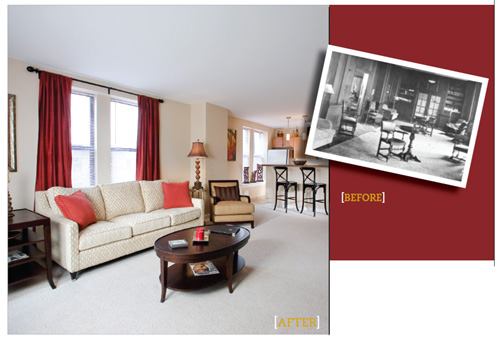The real challenge for Meegan’s team was accommodating contemporary building codes. Since the building was lifted above the street surface by a plinth, designers had to add ramps within the lobby as well as grade the streetscape. They restored common areas whenever possible. The old Ohio State University Faculty Club—now the resident lounge—received particular attention, and today, the wood paneling, plaster ceiling, and red marble floors are as luxurious as they were in the 1920s.
Units range from 427-square-foot studios to 1,437-square-foot two-bedroom apartments, with rents from $750 to $1,350. For the design of interior fixtures and finishes, the approach was “modern with sensitivity toward the historical,” Meegan says. For example, brushed stainless-steel pendant lamps hang near warm-toned cherry cabinets and stainless-steel appliances.
IN SEARCH OF STUDENTS The target market for the Seneca is the area’s student population—students attending Capital University Law School, Columbus State Community College, Columbus College of Art and Design, and Franklin University. But the community also welcomes medical students and doctors working at and near Grant Medical Center, as well as other young professionals in the area.
Doors are set to open in August, but in June, the building was 25 percent pre-leased; Adelman expects to be at 90 percent by opening day. Campus Apartments is so pleased with the success of the Seneca that the company is working on a second historic rehab nearby at the former Ohio School for the Deaf. Meanwhile, the firm is seeking tenants for 15,000 square feet of retail space on the Seneca’s first floor.
The Seneca has come a long way from the decrepit wreck Adelman saw in 2004. “We’re proud that we were able to save [it] from the wrecking ball,” he says.
Elizabeth Lunday is a freelance writer based in Fort Worth.
PROPERTY: Historic Landmark Seneca Hotel Luxury Apartments
LOCATION: Columbus, Ohio
DEVELOPER: Campus Apartments
ARCHITECT: WSA Studio and PZS Architects
RENTS: $750 to $1,350
RENOVATION COST: $21 million
LENGTH OF RENOVATION: 18 months
SCOPE OF PROJECT: Adaptive reuse of a 1917 hotel into luxury apartments
COMPARISON
| BEFORE | AFTER | |
| Use | Luxury hotel for Columbus’ elite | Luxury apartments for students and young professionals |
| Vibe | Renaissance revival | Renaissance revival with modern flair |
| Value | $2 million | Too soon to tell |
ACTION ITEMS
UNEARTHING A GEM
Keep these tips in mind for historical renovations.
Know the building. It’s hard to see what lies behind old walls. The sooner you can “unbury the building,” says project architect John Meegan, principal of WSA Studio, the sooner you know what you’re facing.
Think about compliance. Applying modern codes to older buildings is a challenge. “You’ve got to [be] creative,” Meegan says.
- Be bold. The Seneca will be the only high-end apartment building in the area. But the area’s abundance of students and medical employees provide a made-to-order market.
